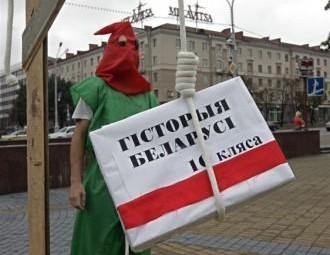Ales Kraucevich: Authorities understand the strength of history as an ideological basis

Due to the tight control of the authorities History Faculties in the Belarusan universities cannot be considered the centers of free thought.
Such opinion in the talk with the EuroBelarus Information Service shared Ales Kraucevich, the historian.
Let us recall that recently there have been rumours that the History Faculty of the Hrodna University will be united with the Tourism Faculty. Could History Faculties be considered certain centers of free thought in the Belarusan universities and what exactly do authorities think about it?
Ales Kraucevich believes that it is wrong to refer to the History Faculty of the Hrodna University as to the “center of free thought”. “For decades this faculty eliminated its best personnel and only blindly devoted people remained. There are good scientists at this faculty but they are awfully afraid; there is no one to rouse free thought there”, - the historian said.
Today’s faculty is profanation
He noted that it is not the first reorganization for the History Faculty of the Hrodna University. The historian believes that it is not a unique case and it can happen elsewhere: “All state structures are aimed at earning money. They try to attract those students who will pay tuition first and invent anything for this. Thus, to keep the department of Belarusan culture, the tourist and Belarusan culture department was formed. It is also connected with deficiency in the number of students”.
What concerns the former dismissals in the Hrodna University, Ales Kraucevich is sure that this story fully invented by the local authorities. “Well, in this situation it is interesting to observe the conduct of Siarhei Matskevich, the Minister of Education and former chancellor of Hrodna University, who is afraid to argue with the local administration”, - the historian noted.
Free thought is not dependent on profession
What if we consider some other cases than that in Hrodna University? Can we say that historical faculties of Belarusan Universities differ from others in the degree of freethinking?
“I don’t think so, - Ales Kraucevich said. – As these are universities that the authorities control most of all, being well aware of the strength of history as an ideological basis for any authority. As soon as somebody writes a book that contradicts official theses or state his/her political stance, they should be ready to get fired. Only few topics that are considered “politically safe” by the current authorities can be worked out for the benefit of patriotic and national historiography. The universities are state, they don’t have freedom, snitches are everywhere; and under such circumstances lectures are afraid. If one says that the History Faculties are centres for free thought it means they are unaware of the present situation”.
The students of the History Faculties don’t differ much from those of other faculties, Ales Kraucevich believes. “Everything depends on the person: if he/she has ability for freethinking, has self-esteem, he will have an opinion of his own”, - the historian highlighted.
-
03.01
-
07.10
-
22.09
-
17.08
-
12.08
-
30.09



























